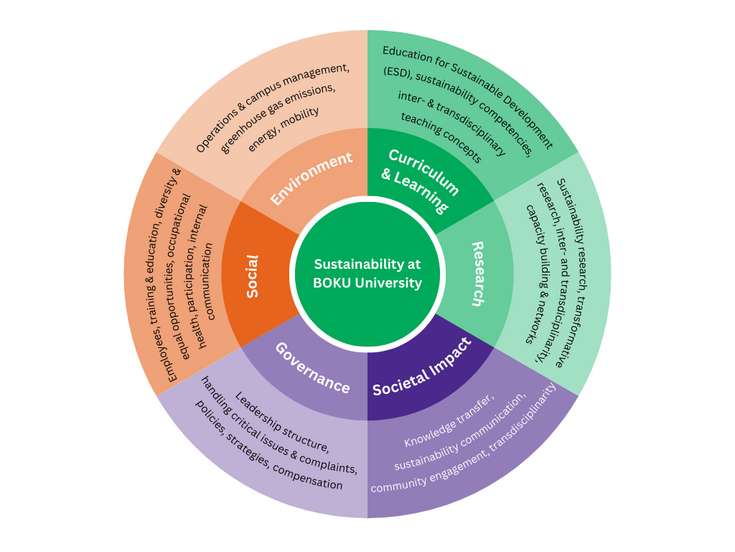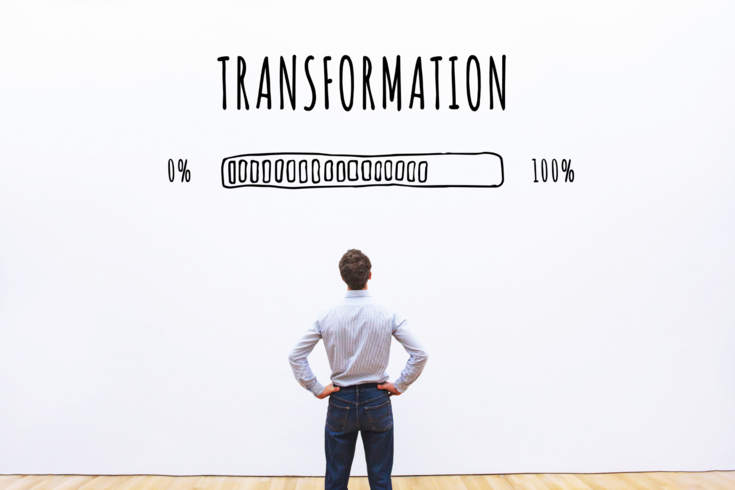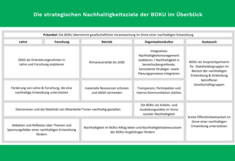BOKU Sustainability Strategy
The Whole Institution Approach
Sustainability holds special significance at BOKU University, which actively pursues a Whole-Institution Approach to integrate sustainability across all areas. BOKU's sustainability efforts are organized into six interconnected themes: teaching and studies, research, societal impact, environment, social aspects, and governance.
The first strategy was developed in a comprehensive process in 2013/14 (2014-18) and was revised and further developed in 2019/20 (2019-24).

Sustainability Strategy 2025-2030
The current phase of BOKU's sustainability strategy is based on three pillars:
- Continuation of ongoing processes
- Flagship projects with potentially transformative character
- Reflection processes
1. Continuation of ongoing processes
In recent years, significant progress has been made, which will continue in the current period of the sustainability strategy.
The strategic goals adopted in 2020 are long-term and fundamental, extending beyond 2024.
These goals formed the basis for the materiality analyses in 2019 and 2024, identifying key topics for the BOKU Sustainability Report.
The annually produced and externally certified BOKU Sustainability Report, initiated in 2019, serves as a tool for continuous monitoring and development of measures.
A sustainability management system has been established to define responsibilities.
Specific working groups discuss particular issues and provide suggestions for implementation projects:
- Operations: Environmental Management Network with subgroups for Energy & Buildings, Resource Management, and Mobility
- Research & Societal Impact: Sustainability Research Working Group
- Organizational Culture: Various units, such as Healthy BOKU and the Coordination Office for Gender Equality, Diversity and Accessibility work on these topics
- Teaching and Studies: The Education for Sustainable Development Working Group initiated training, lectures, discussion papers, and events from 2015-2024
2. Flagship projects with potentially transformative character
A sustainable university can only be achieved to a certain extent through measures that leave individual behavior, structures, or processes unchanged (e.g., switching to UZ46-certified green electricity). While such improvements and optimizations are important, it is also necessary to consider where fundamental changes to processes and structures are needed.
A socio-ecological transformation for sustainable development requires fundamental changes. These changes disrupt prevailing routines, structures, and mindsets, necessitating individual and societal behavioral changes and often encountering resistance. Such processes take time and have uncertain outcomes.
Currently, the following projects with transformative potential are underway (details available HERE):
- Climate Neutrality Goal: Two-thirds reduction in emissions by 2030 and 90% reduction by 2040 (net-zero emissions)
- Organizational Unit for Transformative Sustainability Science: Establishment by 2027
- Changes in the Evaluation of Science: Plan creation by 2025, initial implementation projects by 2030

An example from the field of science:
3. Reflexion & Feedback
In addition to continuing these processes, the BOKU sustainability strategy aims to consider the fundamental changes needed to consistently pursue the path of a sustainable university.
Are we on the right track? Are we overlooking something? Have conveniences crept in that hinder or even counteract the process? Are we staying on the surface, or are we moving towards a fundamental transformation?
In the coming years, we aim to gather feedback from various perspectives and expand the circle of stakeholders. The aforementioned working groups (Core Group, Sustainability Research Working Group, Environmental Management Network) and their events will be used to regularly collect feedback. Additionally, courses will be utilized to conduct exercises on sustainable universities and gather feedback from and about students (e.g., Grundlagen der empirischen Wirtschafts- und Sozialforschung, Inter- and transdisciplinary approaches and processes).


